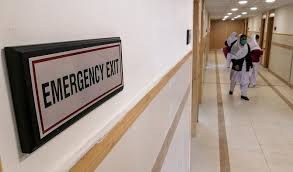
Karachi Reports First Congo Virus Case of 2024: Butcher in Critical Condition
Karachi has reported its first case of the Congo virus for 2024, marking the start of a potentially concerning health situation. The patient, a 32-year-old butcher, tested positive for Crimean-Congo Hemorrhagic Fever (CCHF) late Wednesday evening. He was initially admitted to Dr. Ruth Pfau Civil Hospital Karachi on Tuesday but was later transferred to Jinnah Postgraduate Medical Centre (JPMC) before being moved to the Sindh Infectious Disease Hospital and Research Centre for specialized care.
Dr. Yahya Tunio, the Deputy Executive Director of JPMC, confirmed the severity of the patient’s condition. “He is in critical condition. We have moved him to a specialized hospital for infectious diseases where he will receive appropriate care,” Dr. Tunio stated.
The patient’s profession as a butcher is significant, as Congo fever is commonly transmitted through ticks and can also spread via contact with infected animal tissues during and immediately after slaughter. This particular case raises concerns due to the high-risk nature of the patient’s job, which involves direct exposure to livestock.
The Threat of Congo Fever
Crimean-Congo Hemorrhagic Fever is a viral hemorrhagic fever that can have severe consequences. The virus is primarily transmitted to humans through tick bites or contact with the blood, organs, or other bodily fluids of infected animals. The disease is endemic in parts of Africa, Asia, and Eastern Europe, and Pakistan has reported several cases in recent years, particularly in areas where livestock farming is prevalent.
The case fatality rate for Congo fever can be as high as 40 percent, making it one of the more dangerous viral infections. The virus causes symptoms such as high fever, muscle aches, dizziness, neck pain, back pain, and sore eyes. In severe cases, it can lead to bleeding, organ failure, and death. Unfortunately, there is no vaccine available for CCHF, either for humans or animals, making prevention and early detection critical.
Public Health Concerns
The emergence of Congo fever in Karachi underscores the ongoing public health challenges the city faces. With no available vaccine, the focus must remain on controlling tick populations, ensuring proper handling of livestock, and raising awareness about the risks associated with contact with infected animals.
Healthcare authorities in Karachi are likely to increase surveillance and implement measures to prevent the spread of the virus. Public health campaigns may also be launched to educate the public, particularly those in high-risk professions like butchery and livestock farming, about the importance of protective measures.
Broader Implications
The identification of Congo fever in a major urban center like Karachi could have broader implications for public health management in Pakistan. The city’s dense population and the close proximity in which people live and work raise the risk of the virus spreading if not contained effectively. This case serves as a reminder of the importance of robust healthcare infrastructure, timely medical interventions, and continuous public education to manage and mitigate the impact of such infectious diseases.
As the situation develops, healthcare authorities will need to remain vigilant, particularly as the country is still dealing with other health threats like dengue, which has also seen a rise following recent rainfall in Punjab. The convergence of multiple infectious diseases in the country puts a strain on medical resources and highlights the need for comprehensive disease control strategies.
The first Congo virus case of 2024 in Karachi is a stark reminder of the ever-present threat of infectious diseases and the critical need for preparedness and effective response mechanisms.







